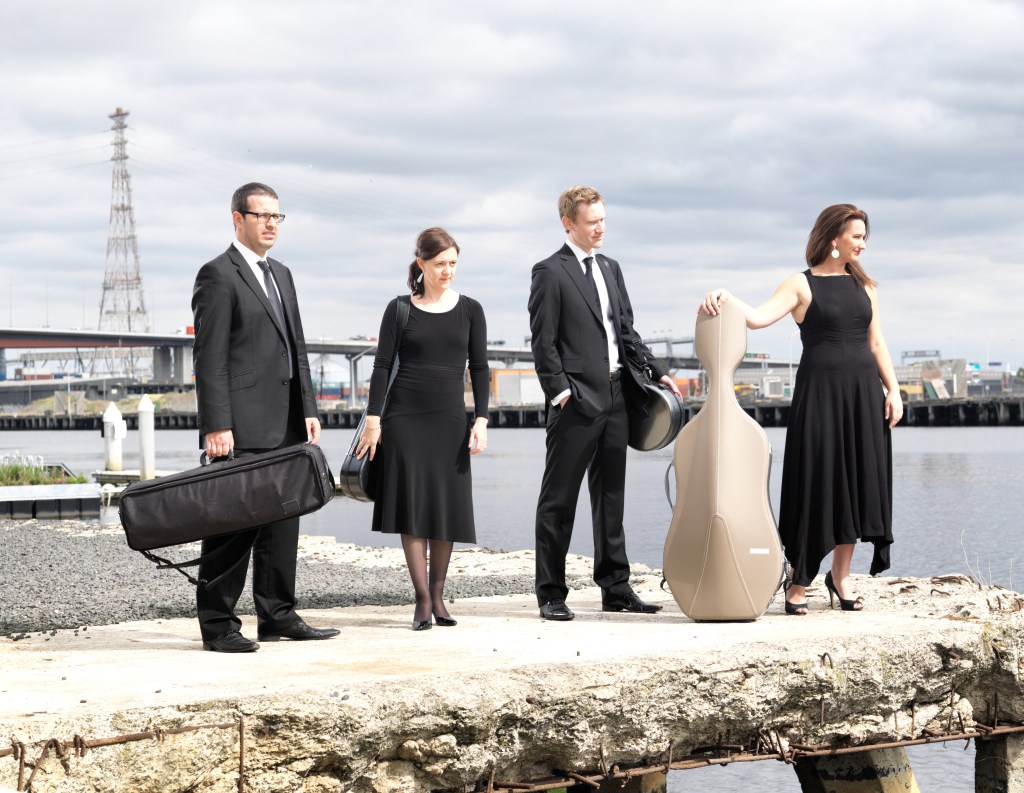
BY STEPHANIE ESLAKE
Justin Williams was in his 20s when he co-founded his ensemble. The violist, now an assistant principal player with the Sydney Symphony Orchestra, emerged onto the chamber music scene with the Tinalley String Quartet.
In its early days, the group planned to enter the 2005 Australian Chamber Music Competition. And after a “lengthy session” of discussion, the artists chose music by Beethoven, Shostakovich, and Haydn.
One of these pieces was Beethoven’s Serioso. And now – 12 years on – Justin and the group will return to this work in upcoming program See Me As I Am. Justin tells us what it’s like to go back to a piece more than a decade after first performing it.
Oh – and that competition? The group took out the Grand Prize.
You’re returning to Beethoven’s Serioso in your gig next month. How did you feel about the work back then, and how has it evolved with you as you’ve grown in your musical life?
Experience matters. I remember treating every solo like an event. I didn’t want to let my colleagues down – especially in D flat major: intonation! And it was an opportunity to find your voice, especially as a violist.
Over the years, one’s technique develops so that one’s focus changes from the microscopic to the broader picture – the long journey. I think, with time, I have learned to appreciate the subtlety of nuance.
I remember we went as a quartet to hear Serioso performed by the Artemis Quartet in Melbourne at Hamer Hall, and we were all so enlightened and inspired by the experience. The energy of their gestures; the power of Beethoven’s music. But starting out, it somehow felt like climbing Everest. I was acutely aware that this quartet marks the beginning of his latter period, the ‘giants’ of his quartet output, and the crown jewels of the quartet repertoire: 127, 130, 131, 132, 135. And it seemed he managed to imbue the prowess and profundity of all of those great works into this compact 20-minute work that he never intended for public consumption – almost as a study of expression.
It’s one of those pieces that is revered by audiences and musicians alike. It’s an amazing experience to hear it live, and equally fun to play!
Playing it together now, have you noticed yourself falling back into old habits?
I think one’s first response to a piece is very powerful, especially as you spend so much time studying it, so one’s approach and thoughts on how a particular phrase goes or how it speaks to you is usually lasting.
There’s always a little of the past with a healthy dose of new discovery. It’s interesting to look back at the technical choices I made when I was younger – sometimes I’m left baffled! The choice of fingerings may change as one’s technique evolves – for better or worse! – and depending on the sound you are searching for. I was usually going for a more impassioned sound, as I was listening so much to Menuhin and Szigeti; which, for a violist, spells trouble.
What’s the biggest change you’ve observed in the way you perform with Tinalley?
It’s hard to say, but I feel my approach to performance is more focused than it used to be. And now it is less about my performance as part of a group, and more about existing within the contribution of sound of one unified instrument.
Why did you choose to return to this piece now?
Firstly, we love it, so we’re always looking for opportunities to play it. It’s also a short piece of 20 minutes in duration, so it fits nicely into a program, particularly if you want to program some shorter pieces in the first half of a concert.
We’re also in the middle of a journey through Beethoven’s middle period quartets. With Op. 95, 74, 59, numbers 2 and 3 in our repertoire, we’re now looking forward to performing Op. 59 No. 1!
Tinalley will be heading in new directions next year. What’s on the cards for you?
We are planning the release of two recordings: one disc featuring the quartets of Debussy and Ravel; and the other of Mendelssohn’s first two quartets, Op. 12 and 13, paired with an arrangement of a short song cycle featuring a collection of songs by Mendelssohn for string quartet and soprano, arranged by Calvin Bowman and sung by the beautiful Greta Bradman.
We also have some exciting festival appearances and some very exciting commissions planned which we will announce in due course. Watch this space!

See Justin perform with the Tinalley String Quartet including Lerida Delbridge, Patrick Murphy, and Adam Chalabi; and guest artist Daniel de Borah on piano. Sydney Opera House October 1, Melbourne Recital Centre October 3.
Discounted tickets for CutCommon subscribers!
Images supplied.




